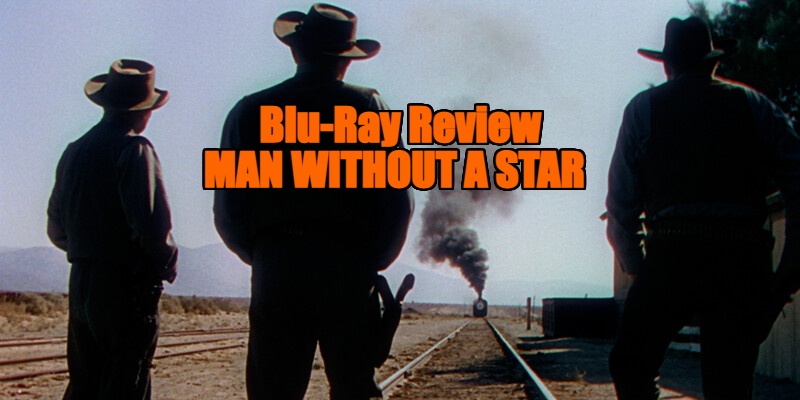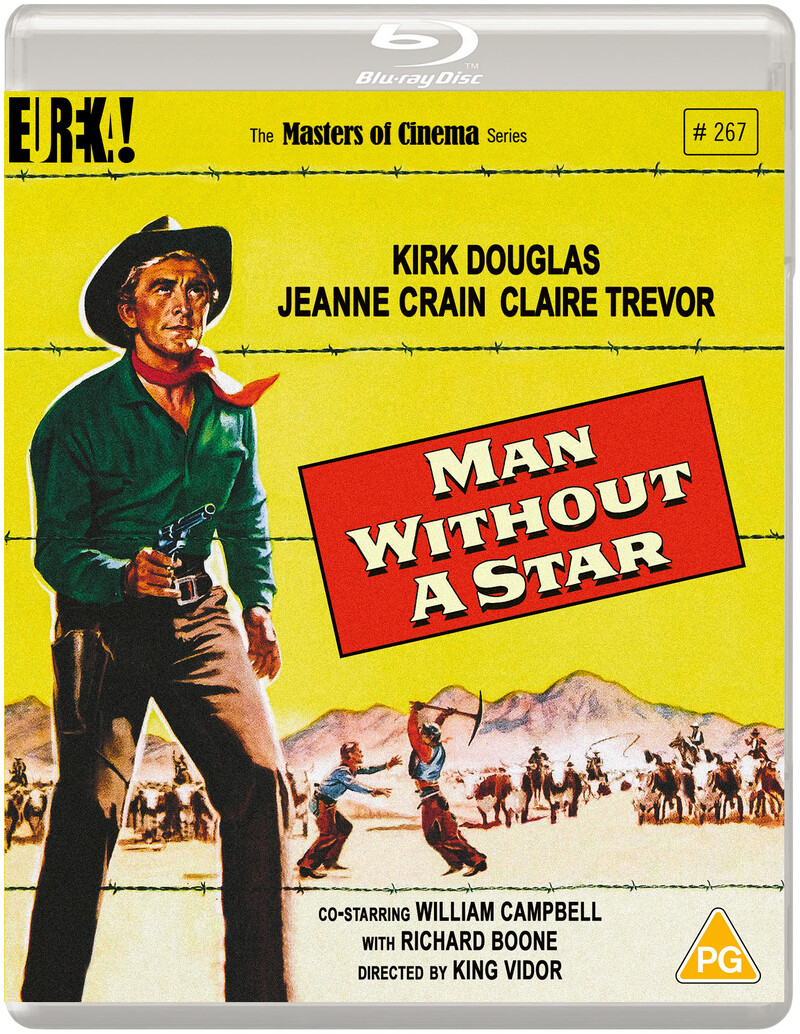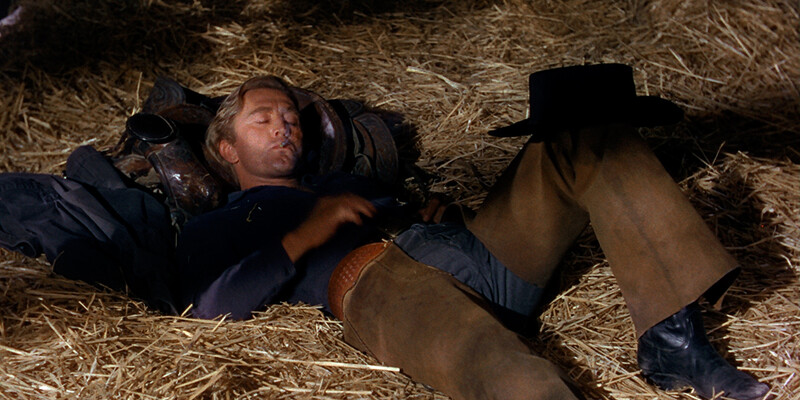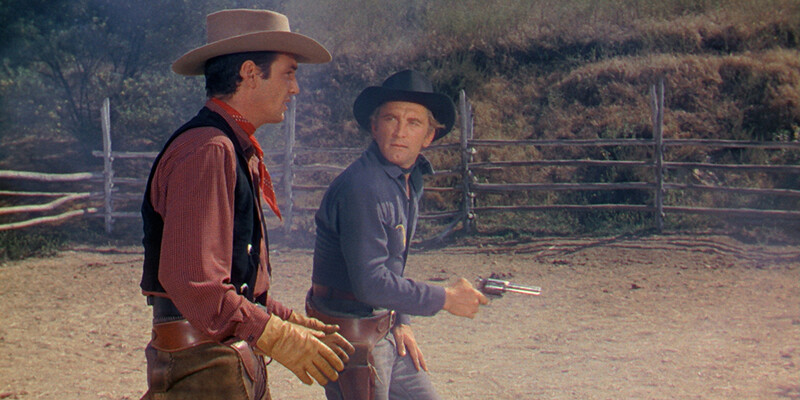
Review by
Eric Hillis
Directed by: King Vidor
Starring: Kirk Douglas, Jeanne Crain, Claire Trevor, William Campbell, Richard
Boone, Jay C. Flippen

The title of King Vidor's 1955 western,
Man Without a Star, might fool you into expecting a story of a vigilante taking the law
into his own hands. In the context of westerns we usually associate
stars with the badges worn by sheriffs and their deputies. Here it's in
reference to celestial bodies. Kirk Douglas's cowboy Dempsey Rae
has a literal star to follow and always knows where True North is by
looking to the heavens. But he lacks a metaphorical star to follow. He's
an aimless drifter, finding his way from one town to the next, one piece
of trouble to another.
Dempsey finds himself in a small Wyoming town when a murder is
committed on the train on which he and teenage wannabe cowboy Jeff (William Campbell) were bumming a ride to Kansas City. The local sheriff suspects Jeff
of the killing, but Dempsey exposes the real murderer, played by western
character actor Jack Elam in one of his creepier roles. With $50
in reward money in their pockets, Dempsey and Jeff head into town. There
they meet ranch foreman Strap Davis (Jay C. Flippen), who hires
the pair to work on the sprawling ranch owned by Reed Bowman (Jeanne Crain), an ostentatious Easterner whose indoor bathroom holds a fascination
for Dempsey.

When Dempsey sets his eyes on Reed, it's more than her plumbing he's
interested in, as it were. Reed uses her seductive charms to convince
Dempsey to become her hired gunman, as she plans to encroach on the
small grazings occupied by local farmers. Dempsey finds himself
conflicted. On the one hand he doesn't like the idea of Reed bullying
the other farmers. On the other, said farmers have begun to use barbed
wire, which Dempsey is vehemently opposed to. The cowboy's chest bears
physical scars from some previous incident involving barbed wire, but it
also represents a threat to the sort of freedom he enjoys, new borders
drawn on a previously open land.
Had Man Without a Star been made a decade later it would
likely have taken a more cynical approach, with Dempsey playing the
opposing ranchers off against one another for his own gain, ala Clint
Eastwood in A Fistful of Dollars. But while Douglas's Dempsey is an anti-hero of sorts, he still knows
right from wrong, even if the film's dynamic makes it difficult to
decide who falls into which category. The darker side of Dempsey is
further lightened by the arrival of a genuinely unambiguous villain in
the form of Richard Boone's Steve Miles, a Texan gunman hired by
Reed to do the dirty work Dempsey refuses to carry out. Dempsey and
Miles have history that's never elaborated upon, but we know these two
had a standoff at some point in the past, and that a rematch is
inevitable.

It all climaxes in a spectacular set-piece involving a gunfight that
takes place amid a stampeding herd of cattle. Today the livestock would
be computer generated, but watching actual cattle run amok makes you
doff your hat to the good old days of practical filmmaking, and the
logistics of the scene are mind-boggling.
By the mid 1950s a grittiness was beginning to creep into Hollywood
westerns, and this can be seen in some of the film's darker moments. The
character of Jeff might be seen as representing the shift westerns were
undergoing in this period. He begins the film as a naive goofball
dressed up in a flashy Roy Rogers outfit he purchases with his reward
money. By the end he's become a cold-blooded killer, taking the wrong
lessons from his idol Jeff, who implores the kid to "do as I say, not as
I do." Despite Campbell's limited acting range, Vidor and screenwriters
Borden Chase and D.D. Beauchamp make the transition
believable. There's a real sadness to the scene in which Jeff pulls a
gun on a drunken tormentor in a bar; it's the sort of throwaway moment
seen in hundreds of westerns but Vidor lingers on its moral
implications, the loss of Jeff's innocence and Dempsey's disappointment
in seeing another young man follow him down the wrong path.

Man Without a Star is notable also for its rather frank
sexuality. Once Dempsey and Reed set eyes on one another it's clear they
share an immediate lust. Reed even invites the cowboy into her much
talked about indoor bathroom, which results in a not so subtly alluded
to coupling in the adjoining bedroom. While it's clear that Reed is
genuinely attracted to the rugged Dempsey, we suspect it's not the first
time she's used her charms to get what she wants.
Douglas reportedly made over a million dollars from the film, which
proved a major box office hit. It's easy to see why it was popular as it
offers something for everyone: sex, violence, psychologically and
physically tortured characters, some light comedy and even a musical
number or two. That it all flows so smoothly is testament to an era of
Hollywood filmmaking when such disparate elements could combine so
easily for an evening's entertainment.

New audio commentary with writers Barry Forshaw and Kim Newman; new
interview with film scholar Neil Sinyard; a trailer; and a collector's
booklet featuring a new essay on the film by film writer Rich Johnson,
and a new piece by critic Richard Combs about the Western films of King
Vidor.

Man Without a Star is on UK
blu-ray from Eureka Entertainment from August 15th.
